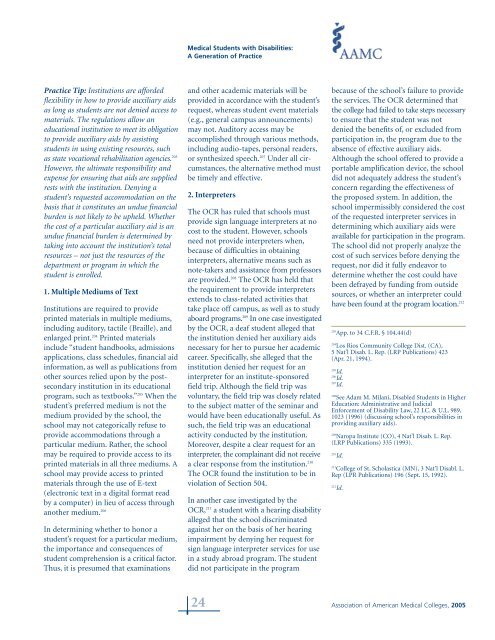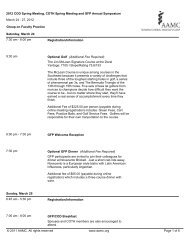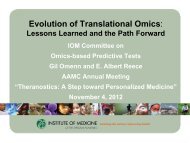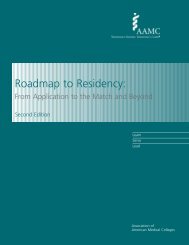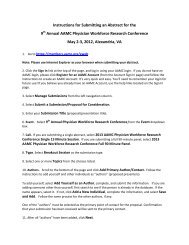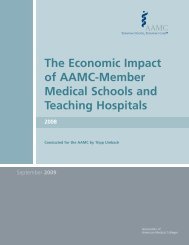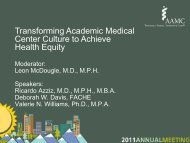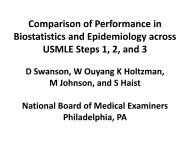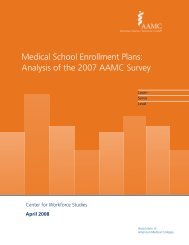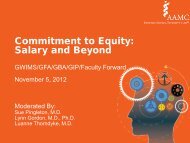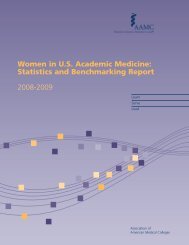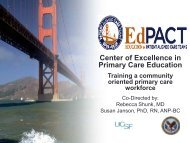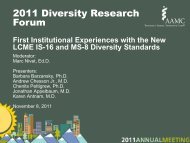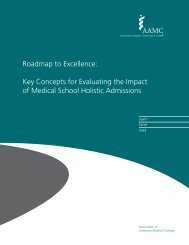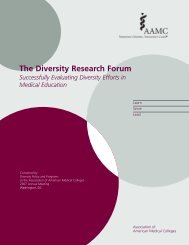Medical Students with Disabilities: A Generation of Practice
Medical Students with Disabilities: A Generation of Practice
Medical Students with Disabilities: A Generation of Practice
Create successful ePaper yourself
Turn your PDF publications into a flip-book with our unique Google optimized e-Paper software.
<strong>Medical</strong> <strong>Students</strong> <strong>with</strong> <strong>Disabilities</strong>:<br />
A <strong>Generation</strong> <strong>of</strong> <strong>Practice</strong><br />
<strong>Practice</strong> Tip: Institutions are afforded<br />
flexibility in how to provide auxiliary aids<br />
as long as students are not denied access to<br />
materials. The regulations allow an<br />
educational institution to meet its obligation<br />
to provide auxiliary aids by assisting<br />
students in using existing resources, such<br />
as state vocational rehabilitation agencies. 203<br />
However, the ultimate responsibility and<br />
expense for ensuring that aids are supplied<br />
rests <strong>with</strong> the institution. Denying a<br />
student’s requested accommodation on the<br />
basis that it constitutes an undue financial<br />
burden is not likely to be upheld. Whether<br />
the cost <strong>of</strong> a particular auxiliary aid is an<br />
undue financial burden is determined by<br />
taking into account the institution’s total<br />
resources – not just the resources <strong>of</strong> the<br />
department or program in which the<br />
student is enrolled.<br />
1. Multiple Mediums <strong>of</strong> Text<br />
Institutions are required to provide<br />
printed materials in multiple mediums,<br />
including auditory, tactile (Braille), and<br />
enlarged print. 204 Printed materials<br />
include “student handbooks, admissions<br />
applications, class schedules, financial aid<br />
information, as well as publications from<br />
other sources relied upon by the postsecondary<br />
institution in its educational<br />
program, such as textbooks.” 205 When the<br />
student’s preferred medium is not the<br />
medium provided by the school, the<br />
school may not categorically refuse to<br />
provide accommodations through a<br />
particular medium. Rather, the school<br />
may be required to provide access to its<br />
printed materials in all three mediums. A<br />
school may provide access to printed<br />
materials through the use <strong>of</strong> E-text<br />
(electronic text in a digital format read<br />
by a computer) in lieu <strong>of</strong> access through<br />
another medium. 206<br />
In determining whether to honor a<br />
student’s request for a particular medium,<br />
the importance and consequences <strong>of</strong><br />
student comprehension is a critical factor.<br />
Thus, it is presumed that examinations<br />
and other academic materials will be<br />
provided in accordance <strong>with</strong> the student’s<br />
request, whereas student event materials<br />
(e.g., general campus announcements)<br />
may not. Auditory access may be<br />
accomplished through various methods,<br />
including audio-tapes, personal readers,<br />
or synthesized speech. 207 Under all circumstances,<br />
the alternative method must<br />
be timely and effective.<br />
2. Interpreters<br />
The OCR has ruled that schools must<br />
provide sign language interpreters at no<br />
cost to the student. However, schools<br />
need not provide interpreters when,<br />
because <strong>of</strong> difficulties in obtaining<br />
interpreters, alternative means such as<br />
note-takers and assistance from pr<strong>of</strong>essors<br />
are provided. 208 The OCR has held that<br />
the requirement to provide interpreters<br />
extends to class-related activities that<br />
take place <strong>of</strong>f campus, as well as to study<br />
aboard programs. 209 In one case investigated<br />
by the OCR, a deaf student alleged that<br />
the institution denied her auxiliary aids<br />
necessary for her to pursue her academic<br />
career. Specifically, she alleged that the<br />
institution denied her request for an<br />
interpreter for an institute-sponsored<br />
field trip. Although the field trip was<br />
voluntary, the field trip was closely related<br />
to the subject matter <strong>of</strong> the seminar and<br />
would have been educationally useful. As<br />
such, the field trip was an educational<br />
activity conducted by the institution.<br />
Moreover, despite a clear request for an<br />
interpreter, the complainant did not receive<br />
a clear response from the institution. 210<br />
The OCR found the institution to be in<br />
violation <strong>of</strong> Section 504.<br />
In another case investigated by the<br />
OCR, 211 a student <strong>with</strong> a hearing disability<br />
alleged that the school discriminated<br />
against her on the basis <strong>of</strong> her hearing<br />
impairment by denying her request for<br />
sign language interpreter services for use<br />
in a study abroad program. The student<br />
did not participate in the program<br />
because <strong>of</strong> the school’s failure to provide<br />
the services. The OCR determined that<br />
the college had failed to take steps necessary<br />
to ensure that the student was not<br />
denied the benefits <strong>of</strong>, or excluded from<br />
participation in, the program due to the<br />
absence <strong>of</strong> effective auxiliary aids.<br />
Although the school <strong>of</strong>fered to provide a<br />
portable amplification device, the school<br />
did not adequately address the student’s<br />
concern regarding the effectiveness <strong>of</strong><br />
the proposed system. In addition, the<br />
school impermissibly considered the cost<br />
<strong>of</strong> the requested interpreter services in<br />
determining which auxiliary aids were<br />
available for participation in the program.<br />
The school did not properly analyze the<br />
cost <strong>of</strong> such services before denying the<br />
request, nor did it fully endeavor to<br />
determine whether the cost could have<br />
been defrayed by funding from outside<br />
sources, or whether an interpreter could<br />
have been found at the program location. 212<br />
203<br />
App. to 34 C.F.R. § 104.44(d)<br />
204<br />
Los Rios Community College Dist. (CA),<br />
5 Nat’l Disab. L. Rep. (LRP Publications) 423<br />
(Apr. 21, 1994).<br />
205<br />
Id.<br />
206<br />
Id.<br />
207<br />
Id.<br />
208<br />
See Adam M. Milani, Disabled <strong>Students</strong> in Higher<br />
Education: Administrative and Judicial<br />
Enforcement <strong>of</strong> Disability Law, 22 J.C. & U.L. 989,<br />
1023 (1996) (discussing school’s responsibilities in<br />
providing auxiliary aids).<br />
209<br />
Naropa Institute (CO), 4 Nat’l Disab. L. Rep.<br />
(LRP Publications) 335 (1993).<br />
210<br />
Id.<br />
211<br />
College <strong>of</strong> St. Scholastica (MN), 3 Nat’l Disabl. L.<br />
Rep (LPR Publications) 196 (Sept. 15, 1992).<br />
212<br />
Id.<br />
24 Association <strong>of</strong> American <strong>Medical</strong> Colleges, 2005


